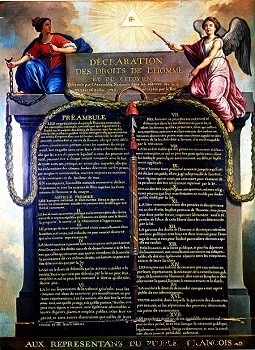
Declaration of Human Rights in Society
Extract from the minutes of the National Assembly, August 20, 21, 23, 24 and 26 &October 1, 1787
Accepted by the King on October 5, 1789
The representatives of the French people, constituted in the National Assembly, considering that ignorance, forgetfulness or contempt for the rights of man are the only causes of public misfortunes and the corruption of governments, have resolved to expose, in a solemn Declaration, the natural, inalienable and sacred rights of man, so that this Declaration, constantly present to all members of the social body, constantly remind them of their rights and their duties; so that the acts of the legislative power, and those of the executive power which can at any time be compared with the aim of any political institution, may be more respected; so that the claims of citizens, henceforth founded on simple and indisputable principles, always result in the maintenance of the Constitution and the happiness of all.
Consequently, the National Assembly recognizes and declares, in the presence and under the auspices of the Supreme Being, the following rights of man and of the citizen:
Article 1 - Men are born and remain free and equal in rights. Social distinctions can only be based on common utility.
Article II - The goal of all political association is the preservation of the natural and imprescriptible rights of man. These rights are liberty, property, safety, and resistance to oppression.
Article III - The principle of all sovereignty resides essentially in the nation. No body, no individual can exercise authority that does not expressly emanate from it.
Article IV - Freedom consists in doing everything that does not harm others:thus the exercise of the natural rights of each man has no limits other than those which ensure the enjoyment of these same rights for other members of society. These limits can only be determined by law.
Article V - The law has the right to defend only actions that are harmful to society. Anything not forbidden by law cannot be prevented, and no one can be compelled to do what it does not order.
Article VI - The law is the expression of the general will. All citizens have the right to contribute personally, or through their representatives, to its formation. It must be the same for all, whether it protects or punishes. All citizens, being equal in his eyes, are equally admissible to all dignities, places and public employments, according to their capacities and without any other distinction than that of their virtues and their talents.
Article VII - No man can be accused, arrested or detained except in the cases determined by the law, and according to the forms it has prescribed. Those who solicit, expedite, execute or cause to be executed arbitrary orders must be punished; but every citizen summoned or seized by virtue of the law must obey immediately; he makes himself guilty by resistance.
Article VIII - The law should only establish penalties that are strictly and obviously necessary, and no one can be punished except by virtue of a law established and promulgated prior to the offense and legally applied.
Article IX - Every man being presumed innocent until he has been declared guilty, if it is deemed essential to arrest him, any rigor which will not be necessary to ascertain his person must be severely punished by law. .
Article X - No one should be disturbed for his opinions, even religious ones, provided that their manifestation does not disturb the public order established by law.
Article XI - The free communication of thoughts and opinions is one of the most precious rights of man:every citizen can therefore speak, write, print freely, except to answer for the abuse of this freedom, in the cases determined by law .
Article XII - The guarantee of the rights of man and of the citizen requires a public force:this force is therefore instituted for the benefit of all and not for the particular utility of those to whom it is entrusted.
Article XIII - For the maintenance of the public force and for the expenses of administration, a common contribution is essential. It must be equally distributed among all citizens, by reason of their faculties.
Article XIV - Each citizen has the right, by himself or through his representatives, to ascertain the need for the public contribution, to consent to it freely, to monitor its use and to determine the quota, the base, the recovery and duration.
Article XV - The company has the right to hold any public official to account for its administration.
Article XVI - Any society in which the guarantee of rights is not assured, nor the separation of powers determined, has no Constitution.
Article XVII - Property being an inviolable and sacred right, no one can be deprived of it, except when public necessity, legally established, obviously requires it, and under the condition of a fair and prior indemnity.
